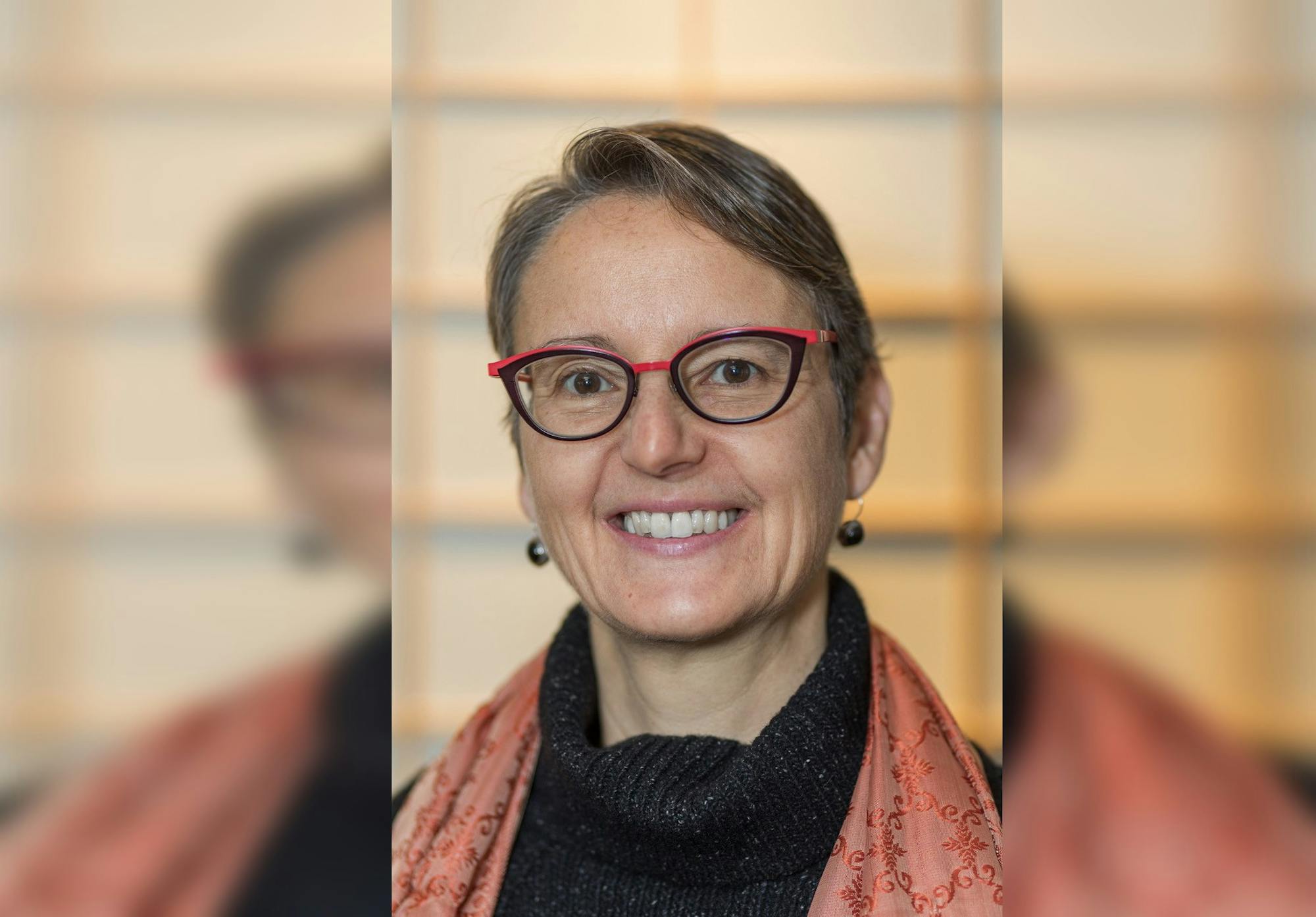This article is featured in the 2021 Commencement special issue.
Dr. Lisa Adams Med’90 co-chairs the College’s COVID-19 task force. In addition to her work on COVID-19 policy for the College, Adams, whose areas of expertise include global health equity and international tuberculosis care, serves as an associate dean for global health at the Geisel School of Medicine and directs the school’s Center for Global Health Equity. Adams also instructs undergraduates and medical students on global health and health equity. The Dartmouth sat down with Adams on May 27 to discuss the College’s road to recovery from the COVID-19 pandemic.
Can you update us on the current state of the road to recovery for the College?
LA: Great progress has been made in terms of our testing positivity rate and where we are in relation to some of our peer institutions. We have had several days in a row of zero new cases among students and zero employees on May 27, and really, if you look at the state numbers too, cases are decreasing at a beautifully steep rate, so it’s all very exciting. We’re still not there yet, but we’re getting there — that’s been my takeaway. For a long time, we were hovering between 20% to 30% for our vaccination coverage rate, but I think the dashboard will show today, May 27, that we’ve hit 60% for all those that are accessing campus. 60% is great. We want to get up to 80% or above, and we think we will get there, but it is all very exciting moving in the right direction.
We are looking at the data. We are trying to see what the current guidance is both at the federal, state and local level, because, remember, Hanover still has a mask mandate in place. We are having to work with all these different layers of guidance and policy, and then recognize that we’re not a household, or an individual, or a store owner or a business. We are a congregate living setting, so we are trying to figure out how it all applies to our setting. I think what we really have acknowledged is that the summer is going to be this transition time.
The College task force statement says that “on-campus activities will increase on June 1, with full access expected to begin on Aug. 1.” Can you elaborate with more details on this phased-in plan?
LA: We are taking some incremental steps because we want to be able to measure things as we go. If you’ve looked at our data over the year, you will see that by week eight or nine of the term, we’ve had a little burst of cases. In winter term, there was a big burst of cases, with 143 at the peak of that outbreak. We thought we were doing really well fall term, then we had a burst of cases the last two weeks of term. Winter comes; we had, actually, a burst at the beginning of winter term and then cases came down. We thought we were doing really well, and then we had the outbreak that we had to work really around the clock to respond to and try to figure out how to contain it. The College health services were maxed out beyond belief in managing hundreds of students who were either in isolation or in quarantine. Based on our experience, recognizing that a congregate living setting is different from a single household, we need to see how things are going before we can make really dramatic or drastic changes. That’s why we have that phased-in plan.
The College reversed its decision to bar guests from Commencement; this year, two guests per graduate will be allowed. Can you speak on the process of implementing this decision?
LA: We worked hard and did a lot of diagramming and plotting and walking the space, adding more diagrams, and measuring and reconfiguring. That was the staging and planning that had to take place to be safe. Could we get people three feet apart? Et cetera. That was really what was behind the process, and we had a great team working on that with us. I really do commend them, people like executive director of conferences and events EJ Kiefer and director of logistics Jim Alberghini who did a lot of the groundwork for being able to allow us to figure out how we could stage this to meet some health and safety requirements and make it possible for people to have family members or guests participate.
With the mask mandate now officially lifted in the state of New Hampshire, why has Dartmouth kept its mask mandate in place? What will happen for the summer?
LA: There is only so much we can do with being in Hanover, but working in a positive, supportive, collaborative relationship with the town has always been important, and never more important than during this pandemic. As I understand, the mask mandate is definitely not going to be lifted before graduation, probably not until later this summer. We are trying to figure out what we can do within those parameters.
The Hanover mask mandate has always said “Mask if you can’t maintain a six-foot distance,” so we are reminding people of that. The science behind transmission really supports this. Going running and passing someone walking on the sidewalk is not a transmission opportunity for the virus. We are really trying to remind people that the mandate has always been in place for when you can’t maintain a six-foot distance. We are trying to reiterate that, because I think people actually sometimes interpret the COVID-19 restrictions as more restrictive than they actually are. And so one thing we’ve been trying to do recently is reinforce what they actually are so that people don't have to be concerned about gathering in groups of nine, for example, or gathering up to groups of 25 if it’s a scheduled event, and we’ve relaxed the in-room guest policy so that you can have two guests in your room who are also students living on campus.
We are also trying to remind people of what is possible, and I know it’s been hard to communicate all this. It’s hard for students, faculty and staff to keep policies straight. It’s been a lot of information and we appreciate everybody taking the guidance so seriously. We are just trying to now remind folks of what they can do.
Editors’ note: the College has lifted its outdoor mask mandate since The Dartmouth’s interview with Adams.
For those students this fall who still want to attend class remotely, will this be an option? Will in-person classes have remote access? Is this the new norm?
LA: A formal announcement will be forthcoming, but it has not been made yet. As you may have heard provost Helble say in various instances, we anticipate there to be a normal fall, which means programs that have been taught in person will be taught in person. There may be support provided to people who arrive and may need to get tested before they could attend classes, but it probably won’t be through remote learning. It is going to be a normal Dartmouth fall term, and we don't offer remote classes under normal circumstances. That, I think, is the plan, but an official announcement is forthcoming.
What can we expect related to testing moving forward, now that the vast majority of people on campus are or will be vaccinated?
LA: We announced Wednesday, May 26 during Community Conversations that people who are vaccinated, starting July 1, will go to testing once a month, and people who are unvaccinated will continue to be tested twice a week. The College is looking to further reduce that testing schedule before the start of term, keeping in mind that the start of fall term for the Geisel School of Medicine and the Tuck School of Business is Aug. 1. There will be further changes coming in the late summer and early fall.
There has been a lot of talk during the pandemic of the College versus Hanover and vice versa. Can you comment about the disputes and collaborations experienced during this tough period in time?
LA: The provost and my COVID-19 task force co-chair Josh Keniston have maintained very open lines of communication with town manager Julia Griffin and Hanover public health officer Michael Hinsley, as well as our Dartmouth College Health Services team. I would say we have had a longstanding relationship with the town. Sometimes, there are differences in approaches and negotiations are required, but I would say that on the whole, it’s a very positive relationship. Again, I would say the College and the town really need each other, so we really are committed to working together in a truly mutually beneficial relationship.
The COVID-19 Task Force you co-chair draws on individuals from many departments within the College. Could you elaborate on how this group has come together during this period and whether this task force will remain or phase out?
LA: We’re just starting to talk about having the task force maybe phase out by the end of the year, or maybe even sometime in the fall. What we want to do is move the activities of the task force into the College’s existing structure, so a lot of operations will return to normal, but if there are questions around ventilation, cleaning and disinfecting protocols, that stays with facilities and operations. If there are student health questions about managing a student who gets diagnosed with COVID-19 in the fall, that will be managed by the College Health Service. There may need to be an advisory group that meets. This is really just my speculation at this point, but we are looking at, first, can we start to decrease the frequency of task force meetings as the decisions and policies revert to our normal practices and operations? And can we really shift the decision making to the existing structures on campus?





